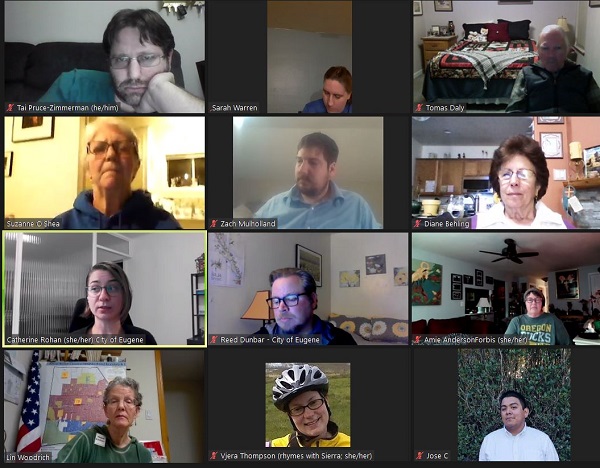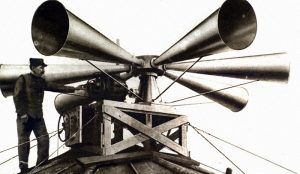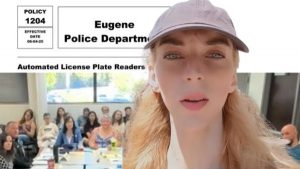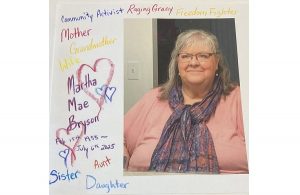Neighborhoods start to identify bicycle and pedestrian projects
7 min read
After voters approved the latest five-year bond, neighborhoods look at their active transportation needs. At the Active Bethel Community Nov. 16, Lin Woodrich.
[00:00:10] Lin Woodrich (Active Bethel Community): And we have Reed Dunbar and Catherine Rohan. I would love to hear from you two and listen to how we can advocate for more walking and biking here in Bethel.
[00:00:23] Catherine Rohan (City of Eugene Transportation Planning): Thanks Lin, and thanks Zach (Mulholland)….So Reed (Dunbar) and I are both part of the transportation planning team with the city, and we will, as a city, be conducting a bicycle and pedestrian project identification process—we’ll use some mapping exercises and community input to ID projects and help us determine how pavement preservation bond money is spent. And the project list will go to city council for final approval before Nov. 1, 2023.
[00:00:52] So all of this engagement and community input will be happening within the next year. Right now we’re envisioning a mix of: open houses for both in-person and virtual that are really spread geographically throughout the city; interactive maps that are hosted online where you can post comments and place pins; tabling at existing events like the farmers markets; and then other methods that we’re still working through.
[00:01:18] Zach Mulholland (Active Bethel Community): Yeah, I guess can you describe the process for determining how those new bond funds are going to be spent? Like a little more detail on how that project list will actually be developed?
[00:01:29] Reed Dunbar (City of Eugene Transportation Planning): Zach, it’s going be a combination of community input, projects that have already been identified in the TSP (Transportation System Plan) and testing those with the public.
[00:01:37] And then we also have been working on a matrix which we have been testing that uses data. So: How many crashes are happening on a corridor? Is that corridor close to bus stops? Is it a Safe Routes to School route? Are there community facilities within walking distance? Do we have a complete sidewalk network? All these different GIS layers that we have…some things related to equity and some other initiatives.
[00:02:01] We have a draft version of that, that we have been using to write grants over the past couple of years. We have one person on our team who goes through all 300 projects in the TSP and evaluates them based on this 20-criteria metric. I’d like the system to be a little bit more automated than it is, and then that’ll be part of that community process as well.
[00:02:22] Zach Mulholland: Can you talk a little bit about the Active Transportation Committee’s role in helping determine what gets funded in terms of bike/ped projects? I know there’s recruitment for that right now and would love to get some more Bethel folks onto that Active Transportation Committee.
[00:02:35] Reed Dunbar: So in the last pavement bond measure—the one that is currently expiring—ATC was specifically written into that bond measure. And the ATC was really, really instrumental in identifying a methodology for choosing which shared-use paths to look at, and for prioritizing that list.
[00:02:56] I think with this next bond, we will look at that very same type of advice. And one of the things that we did is we got on bikes and we rode around and checked out everything. And I think that that’s a role that the ATC enjoys and it was fun for me to ride with them and hear what their thoughts were. We’ve had a very good working relationship over the past five-year bond.
[00:03:16] Sarah Warren (Active Bethel Community): So for the committee, do you have set meetings?
[00:03:19] Reed Dunbar: Second Thursday of the month is the required commitment. And we generally have subgroups like outreach or the infrastructure subcommittee, a minimum of one meeting per month and then maybe two is where we start.
[00:03:34] We are moving to more of a hybrid approach where we can get together periodically but still maintain an online presence. And we’re still figuring out what that mix of in-person versus virtual should be, but it will be a little bit of both.
[00:03:53] Lin Woodrich: We’re going be hopefully working with our city on our area plan next year. And I’m just wondering how we incorporate your information into our area plan because we definitely want Bethel to be more walkable and bikeable and maybe be able to do some zone changes and things like that with our area plan. So how would we best work with you guys in making our goals happen?
[00:04:19] Reed Dunbar: If it’s anything like the River Road-Santa Clara neighborhood planning process, they will assemble a team of different city departments to work with your group.
[00:04:29] And there will probably be elements in your plan related to transportation and parks and open space and housing and economic development and all of those things. And we will have representatives from the city available to lead you through the sorts of programs that already exist, the sort of projects that are already in adopted plans, and then to identify if there are any other things that we should be thinking about at a neighborhood level.
[00:04:56] Catherine Rohan: One other kind of more local engagement opportunity that’s coming up in the Active Bethel Community though, and that’s the city has received an Oregon Safe Routes to School project identification program grant (which is a mouthful), to develop a design concept for making Echo Hollow Road more walkable and bikeable.
[00:05:14] So we’ll be working with Bethel School District ’cause it’s a Safe Route To Schools project and I think we’d like to see representation from Active Bethel Community. If it sounds interesting to you, we would love to get you involved.
[00:05:26] John Q: She also summarized completed, long-term, and short-term projects in the Bethel area.
[00:05:33] Catherine Rohan: So some of the completed projects in the area: We have speed cushions on Welcome Way from Royal Avenue to Candlelight Drive as part of the traffic calming program.
[00:05:42] We also recently completed three traffic studies in the area where we measured speed and vehicle volumes. So that was Amirante, Dove, and then Golden Gardens. So you’ll see information about the outcomes of those coming out soon.
[00:05:57] For the near term, so within the next two years, if not sooner, includes a safer pedestrian crossing at North Danebo at Unthank Street. So there’ll be a pedestrian island as well as flashing lights there. We’re in our final engineering design for that right now. Another project, also adding a flashing crossing to Royal Avenue at Throne Drive. More traffic calming coming to Legacy Street, so along the (Meadow View School) and we’re working with Rachel Tochen, who is the Bethel Safe Routes to School coordinator on that.
[00:06:30] And then projects that are even further out include: Some sidewalks along North Danebo, sidewalks on Highway 99 from Barger to Prairie Road, and then a sidewalk on Prairie Road from Highway 99 to Maxwell— connecting to that bridge over Northwest Expressway.
[00:06:49] John Q: The final designs aren’t finished yet and could change based on funding.
[00:06:56] Zach Mulholland: We mentioned the Royal project in one of those letters we previously sent to Lane County with regards to their Lane County bike master plan, just to voice our support for more bond funding, ’cause we have all these needs. Thanks for including that as one of the bond projects that’s likely to be included.
[00:07:13] Sidewalks out at the end of Royal was another major safety issue that we identified. The lack of sidewalks from Prairie Mountain to Green Hill Road with the county now they’re going to be adding bike lanes to Green Hill in the next five years and to Royal in the next 10 as part of their new Lane County bike master plan. It would be really great if the city could make that connection there to at the end of Royal.
[00:07:36] There’s also a path out to Fern Ridge and the Farm Belt path which are part of the Rivers to Ridges project list that the county is now going to look at funding planning projects for. So those are definitely needs that have been identified in terms of recreation.
[00:07:50] And then I know that in the TSP right now, there’s a grade-separated crossing for Beltline, near Echo Hollow, which I think is in the beyond-20-year project list right now. But we also included that as one of the projects.
[00:08:02] We’re excited to work with you over the next year to identify projects out here in Bethel and get them into the transportation system plan project list, and then get them funded. Just thank you for taking this time…appreciate the city and your support in that work.
[00:08:17] John Q: Residents can support local projects through the Active Transportation Committee, forthcoming city outreach, and through your favorite neighborhood organization. Get credit for your volunteer time in a Eugene-area time bank.



